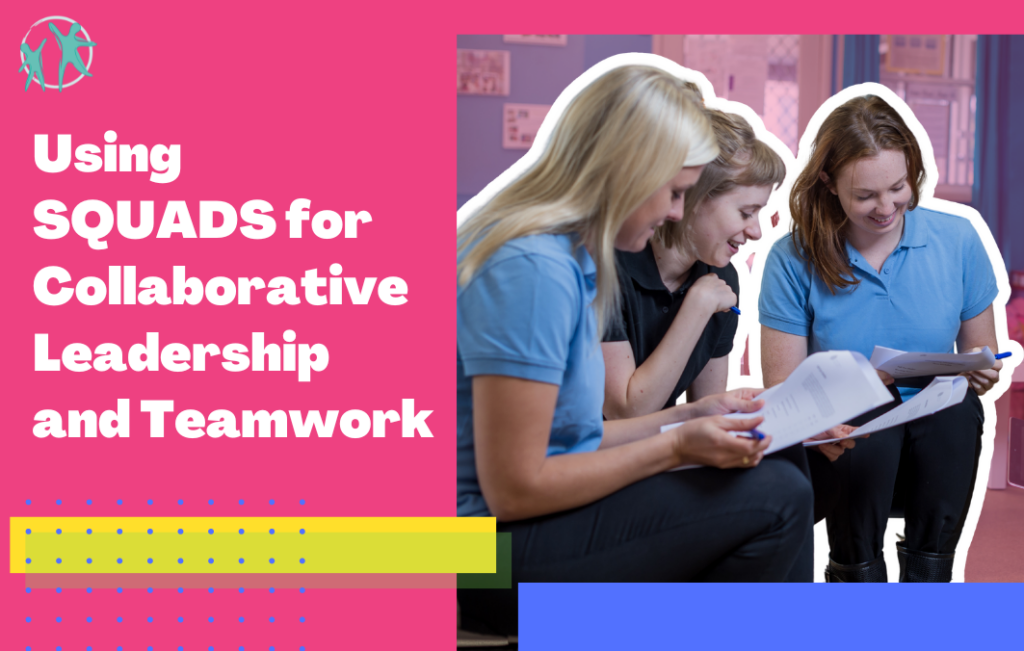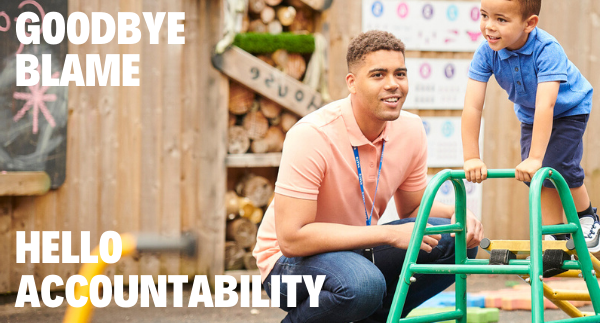
The introduction of EYLF 2.0 has placed a shining beacon on the realms of Collaborative Leadership and Teamwork. This new cornerstone principle of EYLF 2.0 is designed to weave a fabric of shared responsibility and professional accountability throughout the practice.
Enter the concept of SQUADS: dynamic and agile vehicles for fostering collaborative leadership within your service. These action research teams are tailor-made for short-term investigation, dedicated to pinpointing specific challenges or inquiries and initiating enhancements in practice. Action research through SQUADS is a methodical yet practical approach to quality improvement and innovation. It’s about examining the current practices, strategising impactful changes, and experimenting with fresh, progressive ideas. In essence, SQUADS are the laboratories for testing new theories, resolving complex issues, and refining day-to-day practices.
Step 1 - Appoint a SQUAD leader and let them appoint a team
Perhaps the most inspiring aspect of a squad is the opportunity it presents for emerging leaders to step up. SQUADS are a breeding ground for future leaders, offering them a chance to shine and lead a project aligned with their interests and strengths.
The magic ingredient in the SQUAD formula is purpose. The topic or goal of the SQUAD is carefully chosen to align with the squad leader’s passion. This alignment ensures that the leader is deeply invested and genuinely enthusiastic about the project, creating a ripple effect of motivation and engagement throughout the squad.
The SQUAD leader chooses their team. What sets a squad apart is its unique composition – ideally the SQUAD leader chooses one person per ‘room’. This structure ensures a diverse range of skills and perspectives, with each member bringing their unique perspective to the table. This approach not only maximizes individual input but also fosters a sense of ownership and accountability among squad members.
Step 2 – Set Goals and Timeframe
At its core, a squad is a short-term team assembled with a clear, specific purpose in mind. Unlike traditional, long-standing teams, squads come together for a limited period, laser-focused on achieving a particular goal. This time-bound nature injects a sense of urgency and momentum, driving members towards swift and effective action. Most SQUADS should run for a maximum of 3 month with crystal clear actionable goals.
Three months is long enough to accomplish significant milestones yet short enough to maintain high levels of energy and urgency.
Clear goals act as a compass that guides the squad’s daily activities. When each member knows what needs to be achieved, they can align their actions accordingly.
Step 3 – Research
The research phase is the bedrock of the squad’s initiative. During this time, squad members delve into the depths of the subject matter related to their goal. It involves gathering data, understanding best practices, critically reflecting, and gaining insights from children and families or expert opinions.
The squad’s approach to research should be methodical and thorough. The importance of the research phase cannot be overstated. It ensures that the squad’s actions are based on evidence and real-world conditions, not just assumptions.
Step 4 – Implement
With research in hand, the squad moves into the implementation phase. This is where strategies are put into action, and plans are executed.
During implementation, each squad member’s role becomes even more critical. Task lists, timelines, and resource allocations become the daily language. The squad must work like a well-oiled machine, with each part moving in sync with the others. Clear communication and regular check-ins can be particularly effective during this phase.
The squad’s leader is mentored by the nominated supervisor and this relationship is vital during this step, providing guidance, support, and motivation to keep the team focused and on track.
Step 5 – Celebrate and Disband
As the squad journey concludes, it’s crucial to celebrate the achievements and disband with a sense of fulfillment. The act of celebration is not just about acknowledging success; it’s about recognizing the hard work, creativity, and collaboration that went into achieving the goal. Celebrations bring closure, marking the end of the squad’s journey, and providing a moment for reflection and appreciation.
Make the culmination of your SQUAD’s journey not just a moment, but a milestone to remember. Think of opulent, long luncheons that honour their dedication, surprise days off that reward their hard work, and bonuses that reflect the value of their contributions. A legendary celebration not only acknowledges achievement but also becomes a powerful incentive for future volunteers, eager to be part of the next success story.

1. Learning Land SQUAD
Revolutionize your learning spaces with the Learning Land SQUAD. Incorporate children and parents’ feedback to shape environments that resonate with their needs and aspirations.
Questions and resources to kick start your SQUAD
- How do our learning environments reflect the principles of the EYLF and MTOP, and how can we further tailor these spaces to support children’s sense of belonging, being, and becoming?
- In what ways can we better incorporate the perspectives of children and families from diverse backgrounds to create inclusive and responsive learning spaces?
Click here to See what Emma on TikTok has to say about the topic or perhaps ACECQA can shed some light on the topic.
2. Photo Me SQUAD
Discover the transformative power of photography in learning and communication beyond sharing snapshots with parents. Delve into photography’s potential with the Photo Me SQUAD.
Questions and resources to kick start your SQUAD
- How can we use photography to build a sense of belonging and extend on children’s learning?
- What strategies can we implement to ensure that our use of photography respects children’s rights and promotes their agency?
Snap it up! shows us that photos can be used for more than just capturing a moment and this article on the Spoke asks, “What makes a meaningful photo”
3. Children’s Belonging SQUAD
Forge a stronger sense of belonging with the Children’s Belonging SQUAD. Introduce innovative, evidence-backed methods to enhance connectedness in your setting.
Questions and resources to kick start your SQUAD
- Which practices within our service effectively promote a sense of belonging for all children, and how can these be further enhanced in order to align and create secure, respectful, reciprocal relationships?
- How can we measure the impact of our new initiatives on children’s sense of belonging and their learning outcomes?
AERO (Australian Education Research Organisation) has done the research for you and launched a comprehensive practice guide focused on nurturing a profound sense of belonging and connectedness in early childhood education and care (ECEC).
4. Educator Thrive SQUAD
Boost educator engagement with the Educator Thrive SQUAD. Develop sustainable strategies for increased involvement and satisfaction among your Educators.
Questions and resources to kick start your SQUAD
- Can we identify strategies to enhance peer support and team dynamics that will foster a more engaging and collaborative environment for all educators?
- What forms of recognition and appreciation are most meaningful to Educators, and how can these be implemented in our service?
Use an Educator Engagement Survey to kick-start the process
5. Foodies SQUAD
Redefine nutrition with the Foodies SQUAD. Elevate healthy eating practices for both educators and children, and instil lifelong beneficial food habits.
Questions and resources to kick start your SQUAD
- How does our current approach to nutrition and food education reflect the framework’s principle of holistic, integrated and interconnected approaches?
- What innovative strategies can we introduce to encourage children’s healthy eating habits that also foster their sense of agency and wellbeing.
The Kitchen Garden Program is a great place to start for resources to promote a whole-service approach to teaching children about fresh, seasonal, delicious food.
6. Inclusion, Diversity and Fairness SQUAD
Advance social justice and equity with the Inclusion, Diversity and Fairness SQUAD. Challenge your team to reflect on and improve how children perceive inclusion and tackle key diversity issues.
Questions and resources to kick start your SQUAD
- How can we use the cultural responsiveness to guide our approach to inclusion, diversity, and fairness in our service?
- In what ways can we evaluate and enhance our practices to ensure that every child feels included and supported.
Check out this Children’s Voices project and how they were able to capture children’s voices on a range on topics.
7. Children’s Safety Online SQUAD
Equip children with the tools to navigate the digital world safely. The Children’s Safety Online SQUAD focuses on integrating safe tech use into your curriculum.
Questions and resources to kick start your SQUAD
- How can we integrate online safety education into our daily practices in a way that supports a focus on children’s wellbeing and provides them with a strong sense of identity?
- What role does technology play in children’s learning and development in our service and how can we ensure that it is used safely and appropriately?
The Play IT Safe is a great place to start. It is developed in partnership by the Australian Federal Police, the Alannah & Madeline Foundation and the eSafety Commissioner.
8. Neuro SQUAD
Support neurodiverse children in self-regulation with the Neuro SQUAD. Evaluate and enhance your service’s practices to accommodate and celebrate neurodiversity.
Questions and resources to kick start your SQUAD
- How do our current practices support the inclusion and self-regulation of neurodiverse children?
- What strategies can we implement to foster an environment that recognizes and values the contributions of neurodiverse children?
The student wellbeing hub is jam packed with useful resources. Check out brain break bops, specifically designed activities to support self-regulation in neurodiverse children.
9. Team wellbeing SQUAD
Foster a thriving environment for educators with the Team Wellbeing SQUAD. Move beyond basic self-care to develop a holistic, nurturing workplace culture.
Questions and resources to kick start your SQUAD
- How can we implement wellbeing strategies that not only support educators but also create a culture of wellbeing?
- In what ways can we create a supportive work environment that focuses on collaborative relationships and wellbeing for both educators and children?
Kick start this SQUAD by looking at the Educator Wellbeing Guide developed by Be You.
Adrian Pattra is a management consultant with a Master of Education (Ed. Psychology). He is currently facilitating "The Leadership Umbrella" 
Leave a Reply